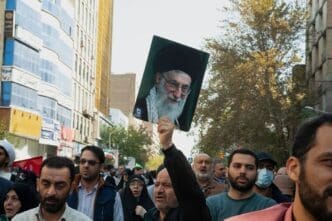The European Union has recently enacted sanctions targeting seven Iranian officials linked to the prison and justice system, citing concerns over the politically motivated detention of EU citizens. For years, the EU has expressed alarm over the increasing number of its citizens detained by Iran on what it describes as unfounded charges. Many detainees reportedly endure degrading conditions without the prospect of a fair trial.
In a decisive move, EU foreign ministers have implemented asset freezes and travel bans against three judges, two prosecutors, and two prison officials. Among those sanctioned is Hedayatollah Farzadi, the head of Tehran’s infamous Evin Prison, already a previous target of sanctions. The EU accuses Farzadi of severe human rights violations against political prisoners, specifically citing restrictions on communication, visitation rights, and arbitrary solitary confinement orders.
The sanctions also extend to Shiraz Central Prison, where the EU claims several European hostages are unlawfully detained, denied fair trials, and subjected to severe rights violations. Additionally, the first branch of the Revolutionary Court of Shiraz in Fars province faces sanctions due to its involvement in unjust trials, executions of political dissidents, and persecution of minority communities.
French Foreign Minister Jean-Noël Barrot expressed approval of the sanctions, labeling Iran’s actions as state-sponsored hostage-taking. He criticized the conditions in which French and European nationals are detained, comparing them to torture under international law. Barrot also issued a cautionary statement advising French citizens against traveling to Iran.
Last month witnessed the release of Frenchman Olivier Grondeau, who had been imprisoned in Iran for over 880 days on espionage charges, which he, his family, and the French government denied. Grondeau was held at Evin Prison, known for detaining Westerners, dual nationals, and political prisoners often used by Iran as leverage in negotiations with Western countries. In a related incident, Italian journalist Cecilia Sala was detained for three weeks in December, shortly after the arrest of Iranian businessman Mohammad Abenini in Milan. Sala was eventually released and returned to Italy in January.
Your World Now
The EU’s sanctions against Iranian officials signify a firm stance on human rights and diplomatic relations, impacting both European citizens and the broader geopolitical landscape. For individuals, especially those with ties to Iran or who plan to travel there, the sanctions underscore the potential risks associated with international travel to regions with strained diplomatic ties. The EU’s actions highlight the importance of understanding international policies and their repercussions on personal safety and rights.
On a broader scale, these sanctions may influence diplomatic relations between the EU and Iran, potentially affecting trade, tourism, and cross-border collaborations. For communities within Europe, such measures may prompt discussions on human rights, international justice, and the role of governmental bodies in protecting citizens abroad. Ultimately, the EU’s response emphasizes the significance of maintaining vigilance and awareness of international affairs that might impact daily life and security for citizens within and beyond European borders.








